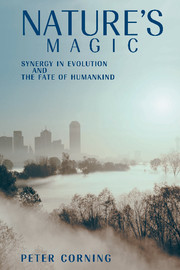Book contents
- Frontmatter
- Contents
- 1 Prologue: The New Evolutionary Paradigm
- 2 The “Enchanted Loom”
- 3 The Magic Castle
- 4 “Black Magic”
- 5 The Synergism Hypothesis
- 6 “The Sorcerer's Apprentice”
- 7 Conjuring Human Evolution: The Synergistic Ape
- 8 Conjuring History: Does Cultural Evolution Have an “Arrow”?
- 9 The Science of History
- 10 Conjuring the Future: What Can We Predict?
- Afterword
- Notes
- References
- Index
3 - The Magic Castle
Published online by Cambridge University Press: 22 August 2009
- Frontmatter
- Contents
- 1 Prologue: The New Evolutionary Paradigm
- 2 The “Enchanted Loom”
- 3 The Magic Castle
- 4 “Black Magic”
- 5 The Synergism Hypothesis
- 6 “The Sorcerer's Apprentice”
- 7 Conjuring Human Evolution: The Synergistic Ape
- 8 Conjuring History: Does Cultural Evolution Have an “Arrow”?
- 9 The Science of History
- 10 Conjuring the Future: What Can We Predict?
- Afterword
- Notes
- References
- Index
Summary
The whole is something over and above its parts, and not just the sum of them all.
AristotleThe power and majesty of nature in all its aspects is lost on one who contemplates it merely in the detail of its parts and not as a whole.
Pliny (The Elder)In the new cosmology, the entire universe is viewed as the product of an evolutionary process. The distinguished physicist Timothy Ferris, in his recent tour de force on the subject, The Whole Shebang (1997), speaks of a universal phylogeny: “If, as many theorists suspect, the constants of nature were decided by random ‘phase transitions’ that took place during the first moment of time, then the laws of nature, too, are evidence of historical events. Evolution is creative: In an evolving universe, all events could not be predicted even if we knew the precise state of the early universe. Cosmology is an ongoing story” [his emphasis]. Ferris notes that the universe may be as much a product of chance as of necessity. However, it is also a product of synergy; the “Epic of Evolution” is quintessentially a story about synergy and history.
The Big Whoosh
Let's begin the story at the Great Beginning. Matter – the basic “stuff” of the universe – would not exist without synergy. Indeed, the synergy started with the “Big Bang” – or what should really be called the “Big Whoosh.” (There are no sound effects in space; it was more akin to an ultra-fast silent movie.
- Type
- Chapter
- Information
- Nature's MagicSynergy in Evolution and the Fate of Humankind, pp. 35 - 76Publisher: Cambridge University PressPrint publication year: 2003



